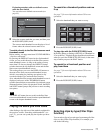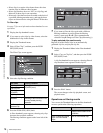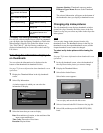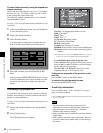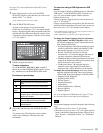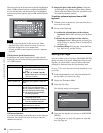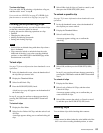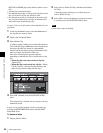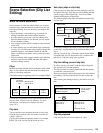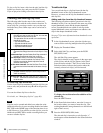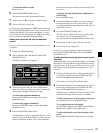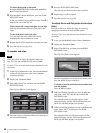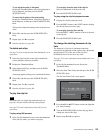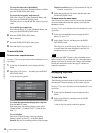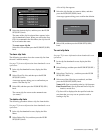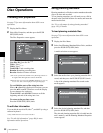
85
Scene Selection (Clip List Editing)
Chapter 5 Operations in GUI Screens
Scene Selection (Clip List
Editing)
What is scene selection?
Scene selection is a function which allows you to select
material (clips) from the material recorded on a disc and
perform cut editing. You can do this by operating on this
unit only.
• Scene selection is a convenient way to perform cut
editing in the field and in other offline situations.
• In scene selection you create a clip list (editing data).
Since the material itself is not affected, you can repeat
this any number of times.
• You can play back the edit list created by scene selection
on this unit.
• In scene selection you can add whole clips or add parts
of a clip. You can add scenes using chapters, change the
playback sequence, and amend or delete In and Out
points. All of these operations can be carried out easily
on this unit.
• Clip lists (editing data) created with the scene selection
function can be used on XPRI and other full-feature
nonlinear editing systems.
Clips
Material recorded with this unit is managed in units called
clips. A clip contains the material from a recording start
point to a recording end point.
Clips have numbers beginning with C, for example C0001.
You can also assign titles to your clips and use the titles to
manage them, instead of the clip numbers. For more
information, “Assigning user-defined clip titles”
(page 107).
Clip lists
You can use the scene selection function to select clips
from the clips saved on a disc and create a cut edit list
called a “clip list”.
Clip lists have numbers beginning with E, for example
E0001. Up to 99 clip lists can be saved on a disc.
Sub clips (clips in clip lists)
Clips (or parts of clips) that have been added to a clip list
are called “sub clips”. Sub clips are virtual editing data that
specify ranges in the original clips. You can use them
without modifying the original data.
The following figure illustrates the relation between clips
and sub clips.
In the above example, the whole of clip 2 has been added
as sub clip 1, and the whole of clip 4 has been added as sub
clip 2.
Sub clip 3 is part of clip 3. Therefore, when clip list E0001
is played back, clip 4 is played after clip 2, and then the
part of clip 3 shown in gray color is played.
Clip list editing (current clip list)
To edit a clip list, you need to load the clip list from the
disc into the unit’s internal memory.
The clip list which is currently loaded into the unit memory
is called the “current clip list”.
The current clip list is always the target of sub clip creation
and editing. Clip list playback also uses the current clip
list.
After creating and editing a clip list, you need to save it to
disc.
Clip list playback
Clips and clip lists are saved together on a disc.
Recording
start point of
clip 2
Recording end
point of clip 2
Clip 1
(C0001)
Clip 2
(C0002)
Clip 3
(C0003)
Clip 4
(C0004)
Unit memory
Current clip list
Can be edited (adding, deleting, and
reordering sub clips)
t Clip list playback
and thumbnail
display
SAVE Mm LOAD
Disc
C0001 (Clip 1)
C0002 (Clip 2)
C0003 (Clip 3)
•
•
•
E0001 (Clip list 1)
E0002 (Clip list 2)
E0003 (Clip list 3)
•
•
•
E0099 (Clip list 99)
Clip 1
(C0001)
Clip 2 (C0002)
Clip 3
(C0003)
Clip 4
(C0004)
Clip list (E0001)
Sub clip 1 Sub clip 2 Sub clip 3
Clips on disc



